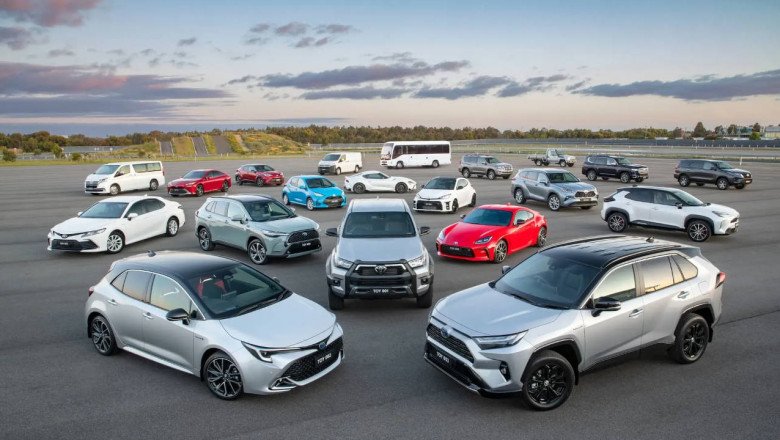
views
Toyota is a global powerhouse in the automotive industry, renowned for its innovation, quality, and commitment to sustainability. Headquartered in Toyota City, Aichi Prefecture, Japan, Toyota is the largest automobile manufacturer in the world, with a presence on every continent and a legacy that spans nearly a century.
From its humble beginnings as a textile company to becoming a leader in hybrid and hydrogen fuel cell technology, Toyota’s journey is a remarkable story of growth, adaptability, and forward-thinking.
Toyota’s origins trace back to 1926 when it was founded as a textile company by Sakichi Toyoda under the name Toyoda Automatic Loom Works. In the 1930s, the company began exploring automotive manufacturing, leading to the development of its first passenger car, the Model AA, in 1937.
This marked the beginning of Toyota’s journey in the automotive sector. The success of the Model AA prompted the establishment of Toyota Motor Co., Ltd. as a separate entity in 1938, dedicated solely to vehicle production.
Toyota has consistently been at the forefront of automotive innovation. In 1997, Toyota launched the Prius, the world’s first mass-produced hybrid electric vehicle, which revolutionized the industry by combining a gasoline engine with an electric motor to reduce emissions and fuel consumption. The Prius became a symbol of Toyota’s commitment to sustainability and environmental stewardship.
Building on its expertise in hybrid technology, Toyota introduced the Mirai in 2014, its first hydrogen fuel cell electric vehicle (FCEV). The Mirai utilizes hydrogen as a clean energy source, emitting only water vapour, and further solidifies Toyota’s position as a pioneer in green automotive technology.
Toyota’s hybrid journey began with the Prius and has since expanded to include a wide range of hybrid models across its lineup. Today, Toyota offers hybrid versions of popular models like the Camry, RAV4, and Highlander, making hybrid technology accessible to a broader audience.
The success of Toyota’s hybrids is a testament to the company’s commitment to reducing environmental impact while providing reliable, fuel-efficient vehicles.
Toyota’s global reach extends far beyond its headquarters in Japan. The company operates manufacturing facilities on every continent, allowing it to serve diverse markets and meet local customer preferences.
The Toyota Production System is a cornerstone of the company’s success, known for its efficiency and high-quality output. TPS is built on two main pillars: “Just-in-Time” production and “Jidoka” (automation with a human touch). Just-in-Time focuses on producing only what is needed when it is needed, in the amount needed, minimizing inventory costs and waste.
Jidoka empowers workers to stop the production line when a problem is detected, allowing for immediate resolution and maintaining high-quality standards. This approach has been widely adopted in various industries worldwide as a model for operational excellence.
Toyota’s lineup includes a wide range of vehicles, from hatchbacks, sedans, SUVs, pick-ups, and sports cars. Some notable Toyota cars include:
Its luxury brand, Lexus, is synonymous with premium quality, performance, and advanced technology, further enhancing Toyota’s market presence.
Toyota also produces commercial and industrial vehicles, such as trucks and buses, catering to various transportation needs globally. Some of the models include:
The Toyota Corolla, launched in 1966, holds the title of the world’s best-selling car model, with over 50 million units sold worldwide. This success reflects Toyota’s ability to produce reliable, affordable, and fuel-efficient vehicles that resonate with consumers.
The Land Cruiser has been in continuous production since 1953, making it one of the longest-running vehicle models in history. Its reliability and durability have made it a trusted companion for those venturing into remote and challenging terrains.
Toyota has set ambitious targets to achieve carbon neutrality by 2035, focusing on reducing emissions across its entire vehicle lineup and manufacturing processes. The company is investing heavily in research and development of alternative energy sources, including battery electric vehicles (BEVs), plug-in hybrids (PHEVs), and hydrogen fuel cell technology. Toyota’s goal is to create a sustainable future where mobility is accessible to all, without compromising the health of our planet.
Toyota’s commitment to quality, innovation, and sustainability has earned it numerous awards and accolades over the years. Some of the awards include:
Toyota’s line-up of cars in the UAE includes an amazing mix of sedans, SUVs, performance cars and commercial vehicles.
Toyota also sells hybrid versions of the vehicles mentioned above. Visit Toyota UAE’s website for the complete list of vehicles sold officially in the country.
Find used Toyota cars for sale in the UAE and new Toyota cars for sale in the UAE.
Subscribe to DubiCars’ WhatsApp Channel for the latest automotive news, guides, polls, and informative infographics.
Stay tuned to UAE’s most popular auto blog for more information about the latest happenings in all of the Emirates.
https://www.dubicars.com/news/top-things-to-know-about-toyota.html
























Comments
0 comment